Menstruation is a funny thing. On the one hand, periods are a natural part of life. On the other, they are usually cloaked in euphemism.
Consider the following commercial: A woman displays a feminine hygiene product. She says “flow” instead of “blood,” and a blue liquid is used instead of a red liquid to demonstrate how efficient the product is at keeping the woman “clean.” The imagery and language used to address menstruation reflect and perpetuate a negative perception of periods as a dirty, unhygienic function. In short, a hassle.
That’s how Claire Lin (林念慈), 31, felt about her period before she ditched her tampons and disposable pads and tried more sustainable alternatives.
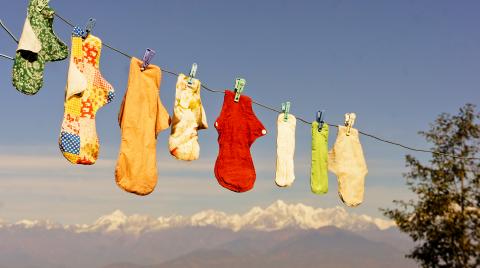
Photo courtesy of Lin Hsiu-ping
“I used to work like crazy. When my period came, I didn’t rest. I took painkillers and kept working. I felt psychological distance from my menstruation,” she says.
Lin is the founder of Dharti Mata Sustainable Workshop (棉樂悅事工坊), a studio in a Nepalese village that manufactures and provides affordable cloth menstrual pads for local women. The studio is inspired by the stories of Nepalese women.
In 2005, Lin joined the Vision Youth Action (願景青年行動網協會), a NGO that brings Taiwanese volunteers to countries such as Cambodia, the Philippines and Mongolia.
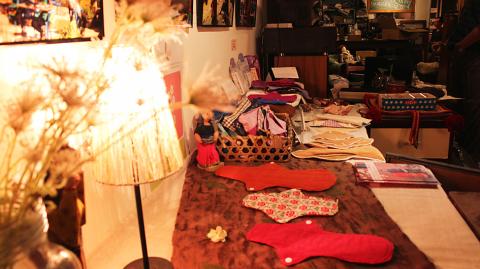
Photo courtesy of Lin Hsiu-ping
BLOOD TABOOS
Sent off to manage projects in Nepal in 2009, Lin soon learned of the taboos women face when menstruating. In Nepalese society, where menstruation is considered impure, periods aren’t just an awkward conversation topic, but also come with harsh stigmas. For example, since menstrual blood is deemed dirty, women and girls use old, sometimes soiled rags as menstrual pads instead of clean ones, and consequently develop infections, according to Lin.
Chhaupadi, a traditional practice prevalent in Nepal’s western region, forbids women from participating in family activities during menstruation. In some cases, they are kept out of the house and forced to live in separate sheds. “Because these villages are located in remote mountains, sometimes you even read news about women [who are confined to sheds] being eaten by tigers,” Lin says.
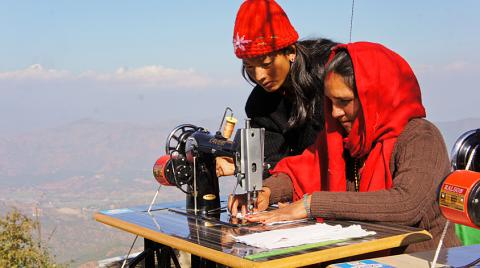
Photo courtesy of Lin Hsiu-ping
After witnessing the hardship facing Nepalese women, Lin and other volunteers visited several villages to hold workshops about menstruation education, share experiences and build dialogue through drama activities and theater games, as well as offer a friendly environment for local women to talk about their periods and bodies.
“A 50-year-old woman shared her first period experience in one of the workshops. She was 12. She was taken to a shed without any explanation. Frightened and confused, she kept crying and felt she was being punished for doing something wrong.” Lin recalls. “Her fear of her own period lingered long after she became a mother.”
In an effort to improve the health of local women, Lin read up on Taiwanese blogs such as Pu Pu Tieh Hsin (布布貼心), which teaches visitors how to make and use sustainable pads, studied and learned the methods and then taught villagers.
Lin left Vision Youth Action in 2012 to establish her own studio at an organic farm in Patalekhet, Nepal, where some 25 farmers — mostly women — gather regularly to sell their products. Lin says that the majority of farmers in Nepal are women because men work laboring jobs in neighboring countries.
Currently, Dharti Mata Sustainable Workshop employs two Nepalese women and is managed by a Japanese volunteer. The pads are sold at a farmers’ market in Kathmandu, mostly to NGO workers and middle-class urbanites, and profits allow the studio to provide affordable pads to local villagers.
“I am fascinated by the Nepalese sustainable way of life and their harmonious relation with nature. But over the years, I have seen more and more cheap, plastic products coming from China and India… I want to show that economically disadvantaged individuals are also entitled to the good things in life,” Lin says.
DIRTY PADS
In Taiwan, disposable pad manufacturers have monopolized the market for years, but their products contain synthetic ingredients and fragrances that can cause adverse allergic reactions, dermatitis and vaginitis.
The impact is not only on health but on the environment as well. In a woman’s lifetime, she may throw away 11,100 disposable sanitary napkins, which are incinerated, end up in a landfill or reappear in the environment, according to the information compiled by Michelle Hua (華宇芝), Lin’s business partner.
In another study conducted by the Women’s Environmental Network, a health charity in the UK, the number of tampons, pads and other applicators an average woman dumps in her lifetime can weigh up to 150kg.
Washable cloth pads offer environmental and health benefits. In addition, since the majority of washable cloth pads are manufactured by small businesses and sold via the Internet, health stores and like-minded shops, they offer a great opportunity to “free oneself from the dependence on multinational companies,” Lin says.
RECONNECTING
Lin says that working with sanitary pads has helped her reconnect with her body. “Nepalese women gave me a chance to re-examine myself, to see my blood and study it, to feel and understand my own body,” says Lin.
Hua agrees. “It is changing habits, going from avoiding it to understanding it. Since you need to wash the pad, you get to know your menstrual blood well. Does it change in color and thickness? Or are there clots? Through cleaning, I am more in tune with my body. It [cleaning pads] may be an obstacle to some, but to me, it has become a special thing.”
Lin and her friends run a study group in Taiwan that meets regularly to discuss topics surrounding women, the environment and sustainability.
Since April, the group has toured the country with an exhibit of sustainable menstrual products by small Taiwanese manufacturers, like Pu Pu Tieh Hsin, 1225 Simple Life (聖誕婆婆小舖), Easy Lohas (容億樂活小舖) and Cherry Pads (櫻桃蜜貼). Also on display are environmentally-friendly products such as menstrual cups from South Korea, Canada and India as well as a photography exhibition documenting Lin’s social undertaking in Patalekhet.
“We want to invite more people to move toward a sustainable way of living,” Lin says.
The touring exhibition is on display at the Facai Timeless Coffee Shop (法采時光咖啡館) in Hualien City until June 16. More information can be obtained at earthygals.wordpress.com.

In recent weeks the Trump Administration has been demanding that Taiwan transfer half of its chip manufacturing to the US. In an interview with NewsNation, US Secretary of Commerce Howard Lutnick said that the US would need 50 percent of domestic chip production to protect Taiwan. He stated, discussing Taiwan’s chip production: “My argument to them was, well, if you have 95 percent, how am I gonna get it to protect you? You’re going to put it on a plane? You’re going to put it on a boat?” The stench of the Trump Administration’s mafia-style notions of “protection” was strong
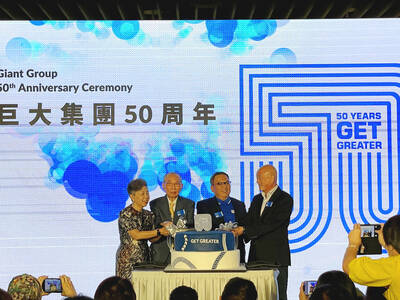
Late last month US authorities used allegations of forced labor at bicycle manufacturer Giant Group (巨大集團) to block imports from the firm. CNN reported: “Giant, the world’s largest bike manufacturer, on Thursday warned of delays to shipments to the United States after American customs officials announced a surprise ban on imports over unspecified forced labor accusations.” The order to stop shipments, from the US Customs and Border Protection (CBP), came as a surprise to Giant, company officials said. Giant spokesman Ken Li (李書耕) said that the CPB never visited the company’s factories to conduct on-site investigations, nor to interview or

Every now and then, it’s nice to just point somewhere on a map and head out with no plan. In Taiwan, where convenience reigns, food options are plentiful and people are generally friendly and helpful, this type of trip is that much easier to pull off. One day last November, a spur-of-the-moment day hike in the hills of Chiayi County turned into a surprisingly memorable experience that impressed on me once again how fortunate we all are to call this island home. The scenery I walked through that day — a mix of forest and farms reaching up into the clouds
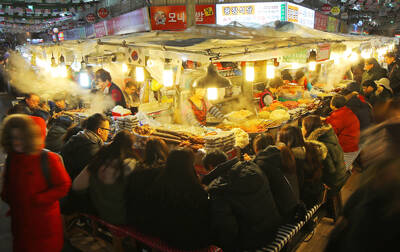
“Eighteen years ago, people didn’t even know the name of this ingredient,” says 58-year-old Gil Sa-hyeon, holding up a cluster of dried brownish stems. “Now it’s everywhere.” His shop, Joseon Yakcho, sits in the heart of Seoul’s Yangnyeongsi Market, South Korea’s largest traditional medicinal herb market, its streets lined with shops displaying buckets of herbs such as licorice root and cinnamon bark that spill on to the pavements, filling the air with their distinct, earthy aroma. The ingredient Gil is referring to is hovenia dulcis, known in Korean as heotgae — the oriental raisin tree that’s become the cornerstone of South Korea’s